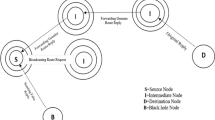Abstract
Fair scheduling is an ideal candidate for fair bandwidth sharing and thereby achieving fairness among the contending flows in a network. It is particularly challenging for ad hoc networks due to infrastructure free operation and location dependent contentions. As there is no entity to serve coordination among nodes, we need a mechanism to overcome inherent unreliability of the network to provide reduced collision and thereby higher throughput and adequate fair allocation of the shared medium among different contending flows. This paper proposes a flow rank based probabilistic fair scheduling technique. The main focus is to reduce the collision probability among the contending flows while maintaining the prioritized medium access for those flows, which ensures a weighted medium access control mechanism based on probabilistic round robin scheduling. Each flow maintains a flow-table upon which the rank is calculated and backoff value is assigned according to the rank of the flow, i.e., lower backoff interval to lower ranked flow. However, flow-table instability due to joining of a new flow, partially backlogged flow, hidden terminal and partially overlapped region exhibits a challenging problem that needs to be mitigated for our mechanism to work properly. We take appropriate measures to make the flow-table stabilized under such scenarios. Results show that our mechanism achieves better throughput and fairness compared to IEEE 802.11 MAC and existing ones.





















Similar content being viewed by others
References
Li, Z., Nandi, S., & Gupta, A. K. (2006). Modelling short-term unfairness of IEEE 802.11 in presence of hidden terminal. International Journal on Performance Evaluation, 63(4), 441–462.
Demers, A., Keshav, S., & Shenker, S. (1989). Analysis and simulation of a fair queueing algorithm. Proceedings on communications architectures and protocols, ACM SIGCOMM, pp. 1–12.
Lu, S., Bharghavan, V., & Srikant, R. (1999). Fair scheduling in wireless packet networks. IEEE/ACM Transaction On Networking, 7(4), 473–489.
Ng, T. S., Stoica, I., & Zhang, H. (1998). Packet fair queueing algorithms for wireless networks with location-dependent errors. Proceedings of IEEE INFOCOM, San Francisco, CA, pp. 1103–1111.
Ramanathan, P., & Agrawal, P. (1998). Adapting packet fair queueing algorithms to wireless networks. Proceedings of ACM MobiCom, pp. 1–9.
Luo, H., & Lu, S. (2001). A self-coordinating approach to distributed fair queueing in ad hoc wireless networks. IEEE INFOCOM, Anchorage, AK, pp. 1370–1379.
Luo, H., & Lu, S. (2005). A topology-independent fair queueing model in ad hoc wireless networks. IEEE Journal on Selected Areas in Communications, 23,(3), 585–597.
Chao, H. L., & Liao, W. (2002). Credit-based fair scheduling in wireless ad hoc networks. Proceedings of IEEE vehicular technology conference, Vol. 3, pp. 1442–1446.
Cheng, J., & Lu, S. (2003). Achieving delay and throughput decoupling in distributed fair queueing over ad hoc networks. Proceedings of IEEE ICCCN, pp. 217–222.
Chao, H. L., & Liao, W. (2004). Fair scheduling with QoS support in wireless ad hoc networks. IEEE Transaction on Wireless Communication, 3(6), 2119–2128.
Alam, M. M., Rashid, M. M., & Hong, C. S. (2006). Distributed coordination and fair queueing in wireless ad hoc networks. Lecture Notes in Computer Science, 3981, 651–660.
Chao, H. L., & Liao, W. (2005). Fair scheduling in mobile ad hoc networks with channel errors. IEEE Transaction of Wireless Communications, 4(3), 1254–1263.
Alam, M. M., Rashid, M. M., & Hong, C. S. (2006). QoS-aware fair scheduling in wireless ad hoc networks with link errors. Lecture Notes on Computer Science, 4238, 1–10.
Chen, W. T. (2008). An effictive medium contention method to improve the performance of IEEE 802.11. Wireless Network, 14 (6), 769–776.
Chetoui, Y., & Boubdallah, N. (2007). Adjustment for the IEEE 802.11 contention window: An efficient bandwidth sharing scheme. Computer Communications, 30(13), 2686–2695.
Vaidya, N., Dugar, A., Gupta, S., & Bhal, P. (2005). Distributed fair scheduling in a wireless LAN. IEEE Transaction on Mobile Computing, 4(6), 616–629.
Goyal, P., Vin, H. M., & Chen, H. (1996). Start-time fair queueing: A scheduling algorithm for integrated service access. ACM SIGCOMM, pp. 157-168.
Rashid, M. M., Alam, M. M., Razzaque, M. A., & Hong, C. S. (2007). Congestion avoidance and fair event detection in wireless sensor networks. IEICE Transactions on Communications, E90-B (12), 3362–3372.
Bianchi, G. (2000). Performance analysis of the IEEE 802.11 distributed coordination function. IEEE Journal on Selected Areas on Communications, 18(3), 535–547.
The Network Simulator—ns-2.http://www.isi.edu/nsnam/ns/index.html.
Perkins, C., Belding-Royer, E., & Das, S. (2003). Ad hoc on-demand distance vector (AODV) routing, RFC 3561.
Acknowledgements
This Research was supported by the MKE under the ITRC support program supervised by the (IITA-2008-(C1090-0801-0002)) and Korea Science and Engineering Foundation (KOSEF) grant funded by the Korea government (MEST) (No. R01-2008-000-20801-0).
Author information
Authors and Affiliations
Corresponding author
Rights and permissions
About this article
Cite this article
Mamun-Or-Rashid, M., Alam, M.M., Abdul Hamid, M. et al. Flow rank based probabilistic fair scheduling for wireless ad hoc networks. Wireless Netw 16, 713–729 (2010). https://doi.org/10.1007/s11276-009-0164-3
Published:
Issue Date:
DOI: https://doi.org/10.1007/s11276-009-0164-3




